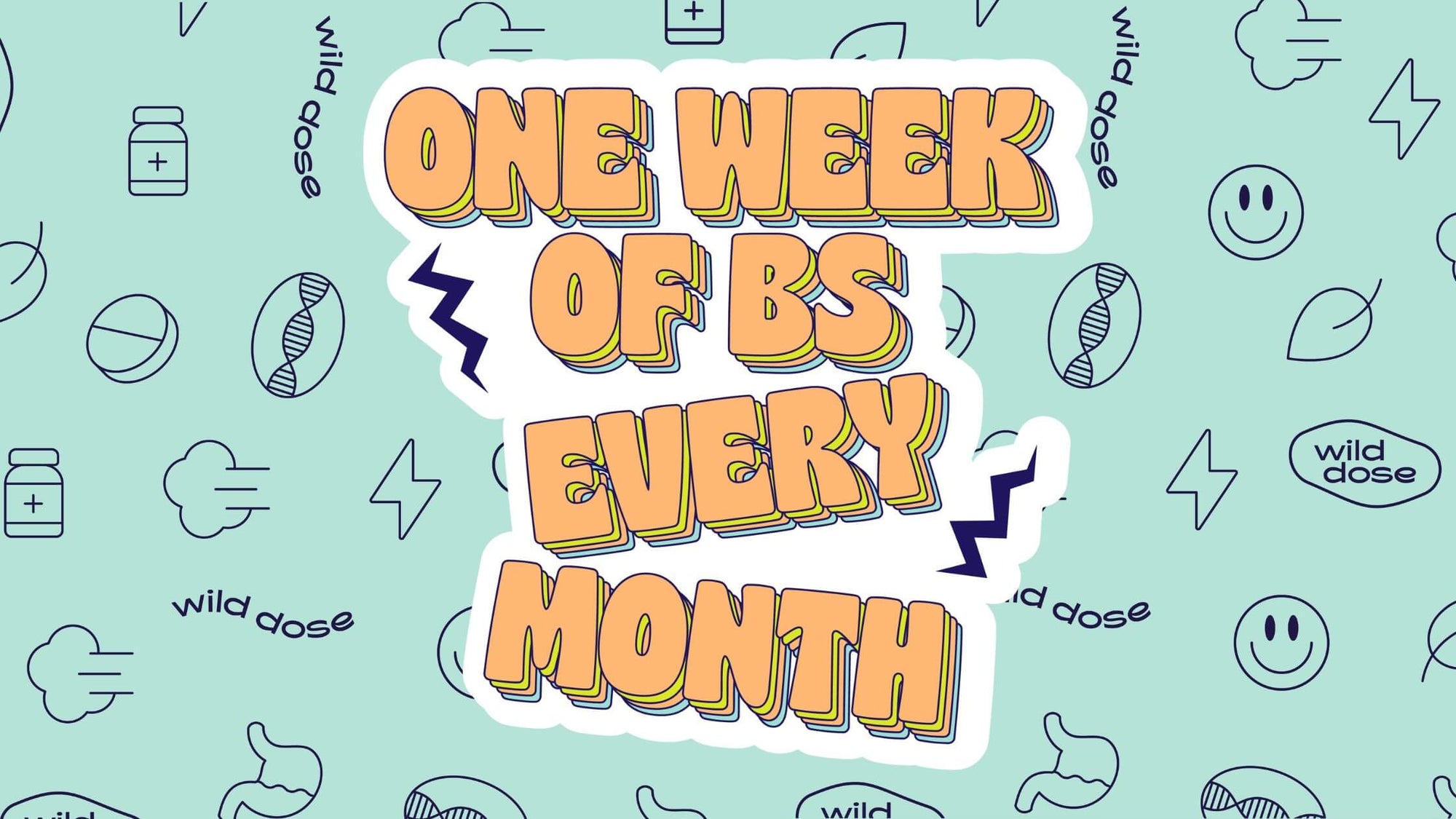What Are the Best Natural Remedies for IBS Symptoms?
Irritable bowel syndrome (IBS) impacts around 11% of the population worldwide. Although its prevalence varies between countries and populations, it’s a common digestive disorder that we’re sure you’ve all heard about.
Sadly, the symptoms of IBS can become severe, especially if trigger foods remain in a person’s diet. In fact, around a third of the people with IBS end up visiting the doctor because of their symptoms.
The most common symptoms of IBS are excess gas, bloating, and abdominal discomfort. It can also cause diarrhoea and constipation.
In this article, we will cover what IBS is, its causes and symptoms, and the best natural remedies that you can try to relieve IBS symptoms without needing to take regular medications (although we always advise to listen to your doctor’s advice if they recommend that you take medications to better manage your condition, of course).
What is Irritable Bowel Syndrome?
Irritable bowel syndrome is a functional gastrointestinal (GI) disorder that causes a range of digestive symptoms. It doesn’t shorten lifespan but can certainly lower a person’s quality of life. IBS patients often require a higher number of doctor’s appointments, tests, scans, and surgical procedures than those without it.
What Causes Irritable Bowel Syndrome?
IBS causes the smooth muscle in the colon to contract more than those without it, which can cause a lot of negative symptoms like cramps and pains.
It’s thought that the causes of IBS include one or more of the following things:
- Changes in gut motility (usually a slowing down of gut motility, causing food to move more slowly through the digestive tract and leading to bloating, gas, and abdominal cramps)
- Changes in the gut microbiota (the millions of bugs that reside in your gut)
- Increased gut viscera sensitivity to certain types of foods
- Small intestinal bacterial overgrowth (SIBO)
- Infections in the digestive tract, leading to inflammation and gut dysbiosis (changes in the gut microbiota diversity)
- Underactive or overactive immune function (which can itself be caused by gut dysbiosis)
- Issues with the gut-brain axis
- Increases in subjective pain perception
- Other gastrointestinal tract issues, such as inflammatory bowel disease (IBD) or cancer
Many studies suggest that a child is more likely to be diagnosed with IBS if one or both of their biological parents or siblings suffer from the condition. Genetic inheritance of IBS indicates that there are certain genes that contribute to IBS.
What Are the Symptoms of Irritable Bowel Syndrome?
The symptoms of IBS can range from mild to severe and can appear at any age. Sometimes, symptoms can be triggered by lifestyle factors, such as stress, and are commonly triggered by trigger foods.
The symptoms of IBS usually include the following:
- Gas and excess flatulence
- Bloating
- Abdominal cramping
- Abdominal pain
Some people may also experience more serious symptoms, including blood in their bowel movements, anaemia, and unintentional weight loss. If you experience any of these symptoms, see your doctor as soon as possible, as it could be something more sinister causing them than IBS.
What Are the Best Natural Remedies for Irritable Bowel Syndrome?
If you’re dealing with IBS symptoms, you might be wondering how you can relieve them and minimise discomfort. You’re not alone if you experience severe digestive symptoms as somebody with an IBS diagnosis, but that doesn’t mean you should suffer in silence!
Luckily, there are plenty of natural remedies you can try to get rid of bloating quickly or relieve abdominal pains and cramps. Below, we’ve covered some of the most effective things you can do to seek comfort and relief when you have an IBS flare-up.
1. Minimise your stress
Admittedly, it’s not easy to reduce your stress. In the busy modern-day world, we all have hundreds of daily tasks to complete, errands to run, work responsibilities, and social events to balance.
Having a jam-packed schedule can leave you feeling stress, run-down, and burnt out, which can exacerbate IBS symptoms, such as bloating, gas, and abdominal cramps. Minimising your physical and psychological stress can do wonders for relieving your symptoms with any medications in sight.
But how can you go about reducing your stress when you’re always so busy? Here are some helpful stress management tips to try when you’re IBS symptoms are flaring up due to high stress levels:
- Reduce your workload and allow yourself to have time to completely relax in a work-free environment
- Avoid overtraining and make sure to fuel your body with adequate nutrition to recover from tough workouts
- Practice daily yoga, meditation, or gratitude
- Perform deep breathing exercises to slow down your heart rate and breathing rate when you’re feeling particularly stressed
- Spend time doing the things you enjoy and find relaxing, such as hobbies and socialising with loved ones
By reducing your stress, you can take your body out of ‘fight, flight, or freeze’ mode and lower your cortisol levels to switch to a parasympathetic state. When your parasympathetic nervous system is dominant, you’ll feel calm and content, and you’ll notice huge improvements in your IBS symptoms.
2. Daily probiotic supplements
Probiotics are live bacteria, such as Lactobacillus, Bifidobacterium, Enterococcus, and Streptococcus. Alongside a number of other bacterial, viral, and fungal species, probiotic bacteria are found naturally in the colon, where they perform a range of essential functions.
Although you have probiotic bacteria in your gut already, taking a probiotic supplement each day can support your existing gut microbiota. Many studies have confirmed the benefits of probiotics in relieving IBS symptoms.
Our probiotic, A Dose For Bloating, contains two billion probiotics, seven digestive enzymes, and seven plant extracts. Together, these ingredients can relieve your IBS symptoms and leave you feeling comfortable and content. You’ll see positive benefits after taking our probiotics for just three or four weeks!
3. Herbal remedies
Consider trying herbal remedies to relieve your symptoms, as they are really effective for those with digestive disorders like IBS. Some of the best herbal remedies to try include:
- Turmeric – this popular root contains curcumin, a compound with anti-inflammatory properties that can reduce inflammation in the gut and alleviate symptoms of IBS.
- Slippery elm – this is a herb that forms a protective layer in the gastrointestinal tract, helping to reduce inflammation and ease negative digestive symptoms.
- Chamomile – this well-known herb has a calming effect on the digestive and reduces inflammation to ease discomfort in the GI tract.
- Peppermint oil – one of the most popular natural remedies for constipation, bloating, and abdominal cramps and pains.
- Liquorice root, which also has anti-inflammatory properties and may help soothe the gastrointestinal tract.
4. Dietary modifications
The foods you eat can make a significant difference in the severity of your IBS symptoms. Consuming lots of trigger foods can worsen your condition and make bloating and discomfort more severe.
Luckily, with some simple dietary changes, you can reduce or even eliminate some of your symptoms. One of the modifications you can make to your diet is increasing your intake of micronutrient-rich foods.
Vitamins and minerals support your body’s digestive processes. They aid your gut bugs and help with fluid balance in your body. Increasing your consumption of foods that are high in vitamins and minerals can, therefore, minimise your digestive issues.
In particular, focus on consuming high-potassium foods. Potassium is an important mineral for fluid balance and regulation in the body. Eating an abundant volume of potassium-rich foods like bananas, avocados, and potatoes, can reduce water retention and bloating in your digestive tract.
Don’t forget to eat lots of healthy fibre too. Fibre is essential for supporting healthy digestion, and it fuels the probiotic bacteria in your gut.
High-fibre foods include whole grains, beans, legumes, fruit, and vegetables. Include a variety of these foods into your daily meals and snacks for maximum digestive benefits.
Generally, low FODMAP diets are suitable for those with IBS. Following this diet means eliminating or significantly reducing your intake of certain carbohydrates called FODMAPs (fermentable oligosaccharides, disaccharides, monosaccharides, and polyols), which are known to ferment in the gut and can trigger IBS symptoms.
Here are some foods to limit when you're on a low-FODMAP diet:
- Oligosaccharide-containing foods, such as wheat, rye, onions, garlic, legumes, and some fruits like apples and pears.
- Disaccharides that are found in lactose-containing dairy products such as milk, yogurt, and soft cheeses.
- Monosaccharides, which are abundant in sugary fruits, such as mangoes and watermelon, honey, and high-fructose corn syrup.
- Polyols, which are alcohols like xylitol, sorbitol, and mannitol, that you can find in some fruits and artificial sweeteners.
So, what can you eat on a low-FODMAP diet?
- Vegetables, including leafy greens, bell peppers, carrots, cucumbers, lettuce, zucchini, and potatoes.
- Fruits, such as bananas, grapes, oranges, strawberries, blueberries, and pineapples.
- Meat, fish, tofu, tempeh, and lactose-free dairy products.
- Gluten-free grains like rice, quinoa, oats (non-contaminated), buckwheat, and cous cous.
- Nuts and seeds
5. Staying hydrated by drinking enough water each day
Dehydration can exacerbate IBS symptoms because a lack of water in the digestive tract can slow down digestion and cause food to become stagnant in your colon. The longer food is in your colon, the more it gets fermented by your gut bugs and the more likely it is that you’ll experience symptoms, such as gas and bloating.
One of the most effective natural remedies for relieving IBS symptoms is staying hydrated. Make sure to drink enough water to avoid feeling excessively thirsty (usually between two and three litres of water a day for the average person). Doing so will support your digestive processes and keep IBS symptoms at bay.
6. Final Thoughts on Relieving IBS with Natural Remedies
IBS is one of the most common digestive issues across the world, and it leads to a range of awful symptoms, including bloating, gas, and pains in the lower abdomen. Luckily, with the above lifestyle changes and dietary adjustments, you can be symptom-free (or you can at least reduce the severity of your symptoms).
Don’t forget to check out our bloat-busting supplement, A Dose For Bloating, which is packed with probiotics, digestive enzymes, and plant extracts that are perfect for those of you with IBS. If you have any questions about our supplement, get in touch, and we’d love to answer them for you








